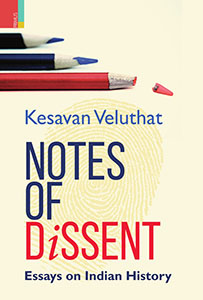
INFORMATION
- AUTHOR : Kesavan Veluthat
- HB ISBN : 978-93-86552-70-9
- POD ISBN : 978-93-86552-71-6
- Year : 2018
- Extent : 214 pp.
- Discount available on checkout
- Usually dispatched within 3 to 5 working days.
Notes of Dissent
| HB ₹1095 . $ . ₤ |
PB ₹ . $ . ₤ |
|
| POD ₹ . $ . ₤ |
e-Book ₹ . $ . ₤ |
INFORMATION
- AUTHOR – Kesavan Veluthat
- ISBN – 978-93-86552-70-9
- Year – 2018
- Extent: 400 + 40 coloured illustrations
- 10% discount + free shipping
- Usually dispatched within 3 to 5 working days.
Brought together here are ten essays, characterized by their dissent to the commonly accepted notions in the field, a first requirement for the growth of knowledge. Issues such as the dialectical process in the religious history of India; the much talked about Mauryan presence in south India; the contradictions in the construction of Kaliyuga in Puranic literature; political criticism in Sanskrit kavya poetry; regional identity and its varied perceptions; evolution of landlordism; emergence of castes and the use of ‘Hindu’ idioms in Christian worship and propaganda form the theme of these essays. A seminal essay by M.G.S. Narayanan and Kesavan Veluthat on the Bhakti Movement in south India, included in this collection, breaks new ground. The pieces on Indian religious history, the notion of Kaliyuga and the Mauryan presence in south India, challenge received wisdom somewhat violently. Those on landlordism and castes in Kerala offer bold alternatives to the existing formulations. The Sanskrit poem, Mahisasatakam, uses poetry as protest; and Manipravalam poetry shows how literature can represent a new sensibility through old genres. The analysis of the work of a Jesuit priest shows the use of anti-Christian symbols in Christian propaganda. Taken together, these essays are likely to unsettle the cozy comfort of the reader.
The Author
Kesavan Veluthat took voluntary retirement from Mangalore University as Professor and Chairman, Department of History.
Brought together here are ten essays, characterized by their dissent to the commonly accepted notions in the field, a first requirement for the growth of knowledge. Issues such as the dialectical process in the religious history of India; the much talked about Mauryan presence in south India; the contradictions in the construction of Kaliyuga in Puranic literature; political criticism in Sanskrit kavya poetry; regional identity and its varied perceptions; evolution of landlordism; emergence of castes and the use of ‘Hindu’ idioms in Christian worship and propaganda form the theme of these essays. A seminal essay by M.G.S. Narayanan and Kesavan Veluthat on the Bhakti Movement in south India, included in this collection, breaks new ground. The pieces on Indian religious history, the notion of Kaliyuga and the Mauryan presence in south India, challenge received wisdom somewhat violently. Those on landlordism and castes in Kerala offer bold alternatives to the existing formulations. The Sanskrit poem, Mahisasatakam, uses poetry as protest; and Manipravalam poetry shows how literature can represent a new sensibility through old genres. The analysis of the work of a Jesuit priest shows the use of anti-Christian symbols in Christian propaganda. Taken together, these essays are likely to unsettle the cozy comfort of the reader.
The Author
Kesavan Veluthat took voluntary retirement from Mangalore University as Professor and Chairman, Department of History.
Table of Contents
Table of Contents
| Preface | Ix |
| Acknowledgements | Xi-Xii |
| Introduction | Xiii-Xix |
| From Dissent To Norm To Tradition: The Dialectics Of Early Indian Religious History | 1-19 |
| The Mauryan Presence In South India | 20-33 |
| Making The Best Of A Bad Bargain: The Brighter Side Of Kaliyuga | 34-47 |
| Laughter In The Time Of Misery: Political Criticism In An Early Modern Sanskrit Poem | 48-63 |
| Regional History In The Making Of Regions | 64-76 |
| Of Ubiquitous Heroines And Elusive Heroes: The Cultural Milieu Of Medieval Maṇipravaḷa Kavyas From Kerala | 77-105 |
| Kāṇa-Janma-Maryādā: Origin And Development Of Land Relations In Medieval Kerala | 106-123 |
| Congealing Of Castes: The Case Of Medieval Kerala | 124-135 |
| Use Of ‘Hindu’ Idioms In Christian Worship And Propaganda In Kerala | 136-153 |
| Appendix: Bhakti Movement In South India | 154-177 |
| Index | 179-193 |




